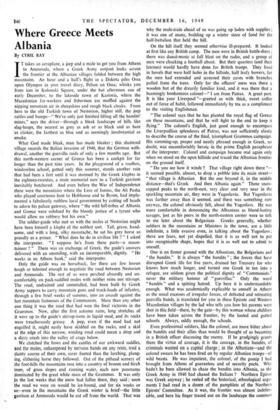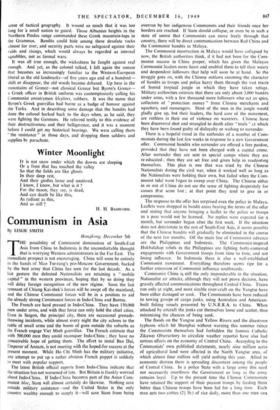Where Greece Meets Albania
By CYRIL RAY
IT takes an aeroplane, a jeep and a mule to get you from Athens to Ammouda, where a Greek Army outpost looks across the frontier at the Albanian villages folded between the high mountains. An hour and a half's flight in a Dakota piles Ossa upon Olympus in your travel diary, Pelion on Ossa; whisks you from ices in Kolonaki Square, under the hot afternoon sun of early December, to the lakeside town of Kastoria, where the Macedonian fur-workers and fishermen are muffled against the nipping mountain air in sheepskins and rough black cloaks. From here to the old Turkish town of Nestorion, higher still, the jeep rattles and bumps—" We've only just finished lifting all the bandits' mines," says the driver—through a bleak landscape of hills like slag-heaps, the nearest as grey as ash or as black and as bare as clinker, the farthest as blue and as seemingly insubstantial as smoke.
What God made bleak, man has made bleaker ; this shattered village records the Italian invasion of 1940, that the German with- drawal, another the guerrilla raids of only a few months ago. But this north-western corner of Greece has been a cockpit for far longer than the past nine years. In the playground of a roofless, windowless school, gutted only this summer, stands another ruin that had been a fort until it was stormed by the Greek klephts in the eighteen-twenties, a mute memorial now to a Turkish garrison inevitably butchered. And even before the War of Independence these were the mountains where the Lion of Janina, the Ali Pasha who played courteous host to Hohhouse and to Byron, had imple- mented a fabulously ruthless local government by cutting off heads to adorn his palace gateway, where " the wild hill-tribes of Albania and Greece were subdued by the bloody justice of a tyrant who would allow no robbery but his own."
The soldier-guide who met us with the mules at Nestorion might have been himself a klepht of the noblest sort. Tall, grave, hand- some, and with a long, silky moustache, he sat his grey horse as proudly as a prince. " What does he do in civilian life ? " I asked the interpreter. " I suppose he's from these parts—a moun- taineer ? " There was an exchange of Greek. the guide's answers delivered with an unsmiling, with an incomparable, dignity. " He works in an Athens bank," said the interpreter.
Only the guide was on horseback, for there are few horses tough or talented enough to negotiate the road between Nestorion and Ammouda. The rest of us were perched absurdly and un- comfortably on pack-saddled mules with neither reins nor stirrups. The road, undrained and unmetalled, had been built by Greek Army sappers to carry mountain guns and truck-loads of infantry, through a few brief weeks of summer, into an assault against the last mountain fastnesses of the Communists. More than any other one thing it was the road that had won the final victories in the Grammos. Now, after the first autumn rains, long stretches of it were up to the guide's stirrup-irons in liquid mud, and its rocks were treacherously greasy. A jeep, even if the mud had not engulfed it, might easily have skidded on the rocks, and a skid at the edge of this narrow, winding road could mean a deep and a dizzy crash into the valley of crags below.
We clutched the bows and the cantles of our awkward saddles, and the mules, unhampered by nervous hands on any reins, trod a dainty course of their own, surer footed than the lurching, plung- ing, slithering horse they followed. Out of the pithead scenery of the foot-hills the mountains rose into a country of broom and birch trees, of grass slopes and running water, each new panorama dominated by the great white mass of the Grammos. It was only In the last weeks that the snow had fallen there, they said ; soon the road we were on would be ice-bound, and for six weeks or so—even in the mountains the Greek winter is brief—the little garrison at Ammouda would be cut off from the world. That was
why the mule-train ahead of us was going up laden with supplies ; it was one of many, building up a winter store of food for the half-battalion that held the hill.
On the hill itself they seemed otherwise ill-prepared. It looked at first like any British camp. The men were in British battle-dress ; there was dance"-music at full blast on the radio, and a group of men were chucking a football about. But their quarters (and their latrines) would hardly have done for British troops. They lived in hovels that were half holes in the hillside, half leafy bowers, for the men had extended and screened their caves with branches pulled from the trees. Only for the officers' mess was there a wooden but of the drearily familiar kind, and it was there that a beamingly bonhomous colonel—" I am from Patras. A great port. It is like your Liverpool "—greeted us with thick, sweet coffee out of force of habit, followed immediately by tea as a compliment to the visiting Englishman.
"The colonel says that he has planted the royal flag of Greece on these mountains, and that he will fight to the end to keep it flying." The colonel's English, just good enough to encompass the Liverpudlian splendours of Patras, was not sufficiently elastic to describe the course of the final, triumphant Grammos campaign. His summing-up, proper and neatly phrased enough in Greek, no doubt, was uncomfortably heroic in the prime English paraphrase of the interpreter. Colonel and campaign became real again only when we stood on the open hillside and traced the Albanian frontier on the ground itself.
" Do you see how it winds ? That village right down there "- it seemed possible, almost, to drop a pebble into its main street- " that village is Albanian. But the one beyond it, in the middle distance—that's Greek. And then Albania again." Those snow- capped peaks to the north-east, very clear and very near in the sparkling mountain air, they were in Yugoslavia. But Yugoslavia was farther away than it seemed, and there was something rum anyway, the colonel obviously felt, about the Yugoslays. He was more comfortable in denouncing the Albanians as blood-lusting savages, just as his peers in the north-eastern corner were to talk to me later about the Bulgarians Greeks generally, whether soldiers in the mountains or Ministers in the town, are a little indefinite, a little evasive even, in talking about the Yugoslays ; there are fears, not yet dispelled, that it is as well not to put into recognisable shape, hopes that it is as well not to admit to oneself.
One is on firmer ground with the Albanians, the Bulgarians and " the bandits." It is always " the bandits " ; the forces that have disrupted Greek life for five years, drained her Treasury for who knows how much longer, and turned one Greek in ten into a refugee, are seldom given the political dignity of "Communists," never the military honour of " guerrillas." Only the word "bandits" and a spitting hatred. Up here it is understandable enough. What was academically explicable to oneself in Athens as the usual excesses of irregular forces, of defeated and retreating guerrilla bands, is translated for you in these Epirote and Western Macedonian villages by the lad who tells you how his parents were shot in this field—there, by the gate—by this woman whose children have been taken across the frontier, by the looted and gutted schools. Always, oddly enough, the schools.
Even professional soldiers, like the colonel, are more bitter about the bandits and their allies than would be thought of as becoming in a British officer discussing the enemy. If he grudgingly grants them the virtue of courage, it is the courage, in the bandits, of criminals wanted on a capital charge ; in the Albanians—and the colonel swears he has been fired on by regular Albanian troops—of wild beasts. He was impatient, the colonel, of the gossip I had brought from Athens of guarantees and of security pacts. Why hadn't he been allowed to chase the bandits into Albania, as the Greek Army in 1940 had chased the Italians ? Northern Epirus was Greek anyway ; he reeled off the historical, ethnological argu- ments I had read in a dozen of the pamphlets of the Northern Epirots Committee. As it was, the frontier was almost indefen- sible, and here his finger traced out on the landscape the common
sense of tactical geography. It wound so much that it was too long for /t small nation to guard. Those Albanian heights in the Northern Pindus range commanded these Greek mountain-tops in the Grammos. Bandits could hide among these desolate rocks almost for ever, and security pacts were no safeguard against their raids and risings, which would always be regarded as internal squabbles, not as formal wars.
It was all true enough, the wickedness he fought against real enough. And yet, as the colonel talked, I felt again the unease that becomes so increasingly familiar to the Western-European liberal as the old landmarks—of five years ago and of a hundred— shift or disappear, the old words become debased. Up here in the mountains of Greece—not classical Greece but Byron's Greece— a Greek officer in British uniform was contemptuously calling his Communist countrymen klephtes, robbers. It was the name that Byron's Greek guerrillas had borne as a badge of honour against the Turks. And in describing some damage that the bandits had done the colonel harked back to the days when, as he said, they were fighting the Germans. He referred testily to this evidence of their destructiveness and their belligerence, and it was a moment before I could get my historical bearings. We were calling them " the resistance " in those days, and dropping them soldiers and supplies 1:1) parachute.



































 Previous page
Previous page